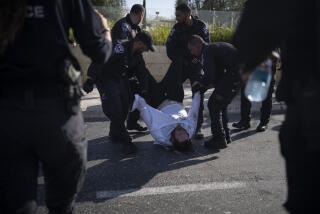Ethiopian Jews See Soldiers’ Suicides as Symptom of Racism
- Share via
JERUSALEM — When a base doctor last month told Molla Belay to discard three crates of sandwiches that he had just prepared as part of his kitchen duties, the Ethiopian-born Israeli soldier assumed that the problem was not in the food but in prejudice here against his dark skin and ancestry, relatives say.
Belay followed orders: He worked all night to remake the sandwiches. But the next day, trembling and barely able to speak, he put his rifle in his mouth and pulled the trigger.
He is one of three Ethiopian-born soldiers in the Israel Defense Forces who have committed suicide since January, raising anew concerns about racism in the ranks and in Israeli society.
Besides these incidents, Israelis learned this week that Avi Asemara, another Ethiopian-born soldier, two months ago was thrown out of an army clinic by a major who told subordinates to post a sign saying, “No kushis [blacks] allowed.”
“I went to my room and cried for an hour and a half,” the humiliated soldier said. The major got an official reprimand. Prime Minister Benjamin Netanyahu, outraged, invited Asemara for a meeting. The parliament’s immigration committee held a hearing on the incident.
Ethiopian Jews came to Israel in two spectacular airlifts in 1984 and 1991. They now number about 60,000 in a Jewish population of 4.5 million. Initially welcomed as long-lost kin, some Ethiopians complain that they have never been fully accepted as Jews and fellow citizens in Israel.
Some private schools and kindergartens have refused to accept Ethiopians. Israeli blood banks for years threw out blood donated by the immigrants from East Africa, fearing that they carried AIDS. Poverty runs high among the Ethiopian minority, with many still living in the cramped trailer parks provided by the government when they arrived. And in the military, an institution many Israelis idealize as the melting pot and leveler of society, some Ethiopians say they have been taunted and stigmatized by officers and fellow soldiers.
“Every morning when I get to the base, six soldiers are waiting for me who clap their hands and yell: The kushi is here!” Alene Tamene, 22, told his niece the day before his March 24 suicide, according to the Jerusalem Post.
Belay, 24, had just agreed to take charge of arrangements for a brother’s wedding and had just five months left before getting out of the army, said Molla Mengistu, an older cousin who noted: “Everything in his family was so good. His future was so bright.”
*
Gentle and reticent, often burdened with feelings of inferiority because of their rural upbringing and lack of education, Ethiopians often do not speak up for themselves, said Mengistu, an advisor to the Health Ministry.
“Because they are so innocent, because they don’t want to disturb the army, they kill themselves instead,” he said.
Leaders in the Ethiopian community say 20 soldiers of Ethiopian ancestry have committed suicide in the past three years. The army says the number is half that and insists that most were attributable to factors unrelated to racism.
“I think there is no other place outside the army where Ethiopian immigrants are so accepted, so respected,” said Brig. Gen. Oded Ben-Ami, an army spokesman. Exceptions occur, he conceded, “but the army knows how to deal with these.”
But Adisu Massala, the first Ethiopian-born member of the Knesset, or parliament, sees “a very deep problem.” He says the 1,750 Ethiopian-born Israelis in uniform make up 0.4% of the military force but have accounted for a third of the army’s suicides in recent years. While he agrees that racism is not widespread, he says it exists and must be dealt with.
Shlomo Mula, chairman of the Umbrella Organization of Ethiopian Immigrants, said the army could start improving by cracking down on racist language. “We came here to be Israelis and to integrate into the Israeli society. We did not come from jungle,” Mula said. ‘We came here as Jews.”
Batsheva Sobelman of The Times’ Jerusalem Bureau contributed to this report.
More to Read
Sign up for Essential California
The most important California stories and recommendations in your inbox every morning.
You may occasionally receive promotional content from the Los Angeles Times.













